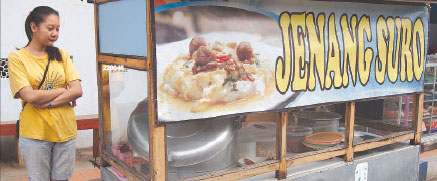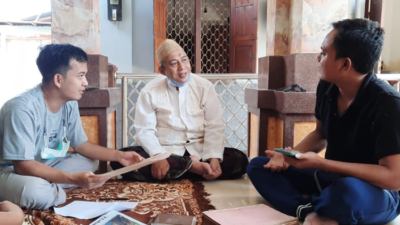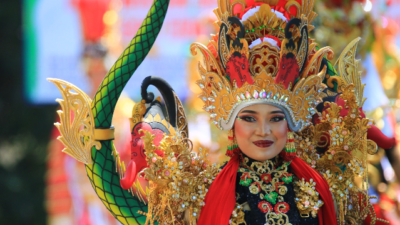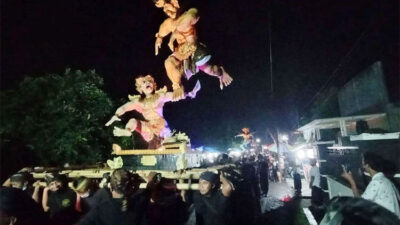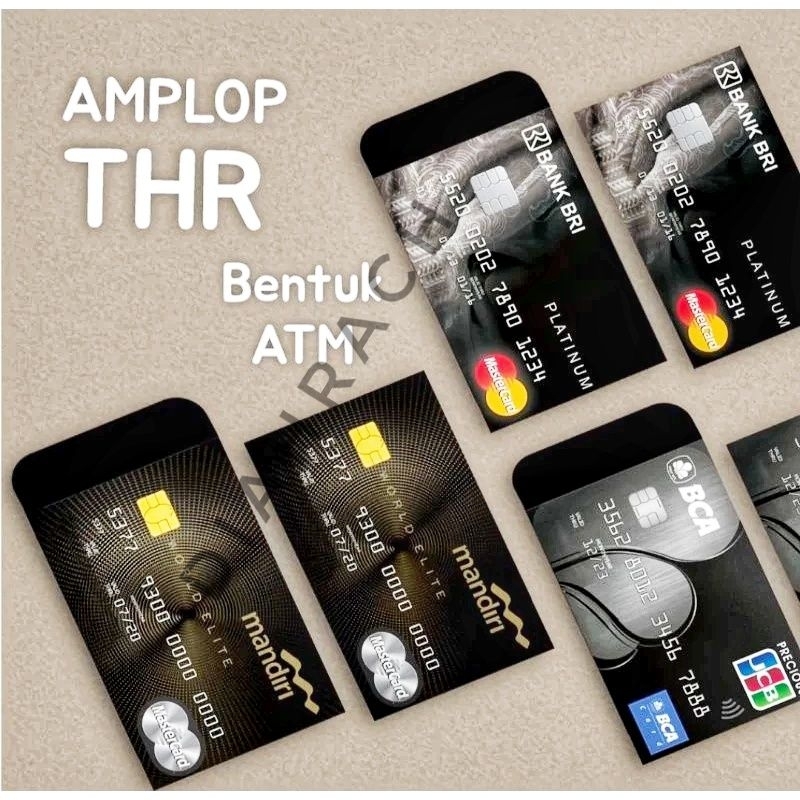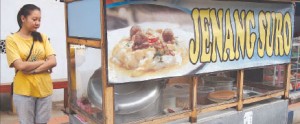 Jenang suro or suro porridge for the Osing tribe is usually only found in the Suro month of the Javanese calendar (month of Muharram Islamic calendar). However, lately the jenang is easily found in several corners of the city of Banyuwangi. Jenang suro is now a food that is popular with residents and has become a commercial culinary dish that is sold in roadside rombongs. Is Koko Komarudin, 20, citizen from Majalengka, West Java, who admitted that he was first interested in selling jenang suro.
Jenang suro or suro porridge for the Osing tribe is usually only found in the Suro month of the Javanese calendar (month of Muharram Islamic calendar). However, lately the jenang is easily found in several corners of the city of Banyuwangi. Jenang suro is now a food that is popular with residents and has become a commercial culinary dish that is sold in roadside rombongs. Is Koko Komarudin, 20, citizen from Majalengka, West Java, who admitted that he was first interested in selling jenang suro.
Originally, owner of a rombong selling jenang suro on Jalan Letjen Sutoyo, Banyuwangi, These people came to Gandrung City just to sell dumplings. But, after settling in Banyuwangi, he was tickled to sell the typical Banyuwangi food. “Yes, this is my brother's business, Asep Saiful Harmony. Initially, my sister sold dumplings. Since a year ago, my sister changed her direction in selling jenang suro,” clear. According to Coco, the idea to sell suro jenang came from his brother's wife who was born in Banyuwangi. even so, Asep's wife is still of Sundanese descent.
“In Banyuwangi, it's like making jenang suro in the month of Muharram. From there I dared to make and sell it every day,” explained the man who lives on Jalan Brantas, Replacement Village, Banyuwangi, that. The idea of selling suru jenang was considered strange by traders from Sunda who settled in Banyuwangi. “He's a strange Sundanese, if I say so, cook Sundanese people selling jenang Suro,” Typhoon joked, a siomay trader from Sunda who usually hangs out next to Koko's rombong.
Currently there are two groups belonging to the Koko family that sell jenang suro. Besides on Jalan Letjen Sutoyo, there is also a rombong jenang sum near the Commental bridge, Chinatown area, Karangrejo Village, Banyuwangi. “We have two caravans for the jenang suro sale. In the past, it was rombang, yes, for selling dumplings. Since a year ago our rombong has been replaced with jenang suro writing. We are no longer selling dumplings, the total change in selling jenang suro every morning,” explained Coco.
Asked the reason why there was a complete change in selling jenang suro compared to selling siomay, according to him, jenang suro is more practical than siomay. “Besides that, we earn more when we sell jenang sure than when we sell dumplings. Making it is also easy and practical. One hour is up,” beber Koko. Although the taste is not as tasty as the original Banyuwangi suro jenang, but as a Sundanese who sells jenang suro, until now he has never received any complaints from consumers regarding the taste (taste).
“Thank God, in general, not many people complain about the taste. Maybe because my brother-in-law has been in Banyuwangi for a long time, So, he already knew the spices for jenang suro. Yes, hopefully this suro jenang made by the Sundanese people will suit the tongue of the Banyuwangi people,” said the man who moved to the City of Gandrung since graduating from high school. Coco confessed, all critical customers sometimes ask about the suro jenang. For example, how come the rice porridge is plain?, there is no mixture.
Besides that, There is also no thinly sliced and fried coconut or what is called serundeng. “But rarely do people ask for details like that. However, when they want the jenang suro to approach the original, we will work for customer satisfaction,” said Coco. Meanwhile, young people or people who are customers of jenang suro don't really have a problem with the contents of the porridge. Connoisseurs of young people generally claim to be satisfied.
“The contents of the suro jenang that are sold are almost the same as what is made in my family every Muharram, only maybe it's not as delicious. When compared with jenang suro in my village, the taste is less kicking a little. But that's okay, I don't have to wait for the month of Muharram to enjoy it,” explained Wulansari 24, residents of Benculuk Village, Cluring District. Jenang suro made in Koko's family is almost always sold out every day. On normal days, spending one pot of jenang suro takes a bit longer than on holidays.
“It's perfect for breakfast on Sundays or holidays. If it's a normal day, trading is over 09.00 or beat 10.00. If it's Sunday or a holiday, o'clock 08.00 it's finished,” explained Coco. Koko ncngalat often gets orders from consumers in large quantities. However, orders for jenang suro in large quantities are almost certain to occur in the month of Muharram. “Sometimes there are also those who order a lot other than the month of Muharram, It's usually for studying and reading. But, usually orders in large quantities occur in the month of Muharram.
He said it was used for salvation and delivered to neighbors. If you buy it may be more practical, because you don't have to cook at home,said the man of birth 17 July 1994 the. He was asked whether he knew the philosophy of jenang suro Banyuwangi every month of Muharram? Koko admitted that he only knew that jenang suro was usually used as a celebration in the month of Muharram. “I don't understand philosophy,” he said. Just know each 10 In Muharram, the Osing people usually make jenang suro and distribute it to neighbors.
Making Suro jenang does not have to be on the right date 10 Muharram, can also be done on other dates throughout Muharram. The making of suro jenang in the month of Muharram aims to commemorate Noah's struggle to save his people from the flood disaster. The ingredients in the suro jenang forget the symbols of Noah's supplies. Jenang sum in the style of the Osing manga is made of twelve. But, the contents of the cassava corn, peanut, spoken, and others. That said, these items are symbols of the rest of Noah's provision with his people.
Then, Prophet Noah ordered his people to cook the provisions into one so that there would be enough for the safe people. At the same time as an expression of gratitude to God for the salvation provided by the disaster. Before jenang suro is distributed to neighbors, usually begins reading a special prayer about salvation and gratitude. The prayer is recited before the jenang suro is distributed with the aim that the jenang distributed is beneficial to residents who receive and are blessed by God in their lives.. (radar)
